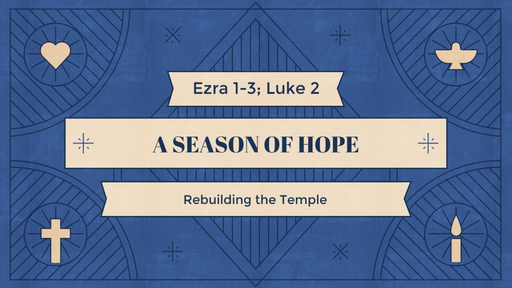Ezra 4

Notes
Transcript
Opposition to the Rebuilding of the Temple
Opposition to the Rebuilding of the Temple
1 Now when the adversaries of Judah and Benjamin heard that the returned exiles were building a temple to the Lord, the God of Israel,
2 they approached Zerubbabel and the heads of fathers’ houses and said to them, “Let us build with you, for we worship your God as you do, and we have been sacrificing to him ever since the days of Esarhaddon king of Assyria who brought us here.”
Only 4 chapters in, and the enemies “adversaries” are already on the attack. These Assyrians were the descendants of the mixed people called “Samaritans” in the N.T.
Notice their approach, “we’re one of you, we worship the same God as you do”. Not only did they say they worshiped God, but they sacrificed to him.
ESARHADDON (Akkadian: Aššur-aḫu-iddina; “Aššur has given a brother”). Son of Sennacherib; king of Assyria from 680 to 669 bc.
SENNACHERIB (סַנְחֵרִיב, sancheriv). Assyrian king who reigned 704–681 BC. Invaded Judah at least once during Hezekiah’s reign and moved the Assyrian capital to Nineveh.
The problem with their worship was God “YAHWEH” was not the only God they worshiped, as they had others.
29 But every nation still made gods of its own and put them in the shrines of the high places that the Samaritans had made, every nation in the cities in which they lived.
The statement was not “technically” wrong, but was not fully truth, and was mean to apparently mislead the leadership.
3 But Zerubbabel, Jeshua, and the rest of the heads of fathers’ houses in Israel said to them, “You have nothing to do with us in building a house to our God; but we alone will build to the Lord, the God of Israel, as King Cyrus the king of Persia has commanded us.”
4 Then the people of the land discouraged the people of Judah and made them afraid to build
5 and bribed counselors against them to frustrate their purpose, all the days of Cyrus king of Persia, even until the reign of Darius king of Persia.
The Jewish leadership )Zerubbabel, Joshua, and the rest of the heads was not fooled.
Their response did not take long deliberation, and was not questioned. They did not want anyone else to help.
First, the temple was for the God of Israel - and not the god these people worshiped.
Second, they had received commission by King Cyrus to rebuild the temple and had the authority to carry out and complete the task on their own.
When they refused help, notice the response from the “adversaries”.
Discouraged the people of Judah
Made them afraid to build
Bribed counselors against them
all the days of Cyrus (II) king of Persia (559 B.C.) Babylon fell 539 B.C., shortly after the Jews released.
even until the reign of Darius king of Persia (521 B.C.), allowed rebuilding around 2 years after appointed king (519 B.C.) Temple was completed at 515 B.C.
6 And in the reign of Ahasuerus, in the beginning of his reign, they wrote an accusation against the inhabitants of Judah and Jerusalem.
Opposition continued during the time of Xerxes. Xerxes, also known as Ahasuerus in the Book of Esther. Reigned from 486-465 B.C.
While this and the following verses are chronologically out of order, they are placed here for the understanding of the reader of how long they endured opposition. 539(ish) B.C. to 458 B.C. ~ 80 years.
Ezra recorded nothing of the nature or results of the accusation except that it apparently kept the Israelites from working on building projects. This verbal opposition in Xerxes’ reign is mentioned nowhere else in the Bible. This verse sets the stage for the following letter which was written in the reign of Persia’s next king.
Pleading to the King
Pleading to the King
These verses to the end can be thought of as a second thought, or something important placed in parentheses.
7 In the days of Artaxerxes, Bishlam and Mithredath and Tabeel and the rest of their associates wrote to Artaxerxes king of Persia. The letter was written in Aramaic and translated.
Opposition against the Jews was strong during the time of Artaxerxes. The focus of the narrative is on two letters written during his reign (464–424). Because the enemies’ letter and the king’s reply brought the work on the city walls and foundations to a halt, it seems logical that the letter was written before the return of Nehemiah, for under Nehemiah the building projects resumed and were completed. Though the letter was composed by people who spoke a northwest Semitic dialect (like Hebrew) it was written in the Aramaic language (the trade language of the day). It was in square Aramaic script rather than in the slanted Hebrew type of script or in cuneiform signs. Ezra 4:8–6:18 and 7:12–26 are in Aramaic. Perhaps Bishlam, Mithredath, and Tabeel were men from Samaria.
8 Rehum the commander and Shimshai the scribe wrote a letter against Jerusalem to Artaxerxes the king as follows:
9 Rehum the commander, Shimshai the scribe, and the rest of their associates, the judges, the governors, the officials, the Persians, the men of Erech, the Babylonians, the men of Susa, that is, the Elamites,
10 and the rest of the nations whom the great and noble Osnappar deported and settled in the cities of Samaria and in the rest of the province Beyond the River.
Rehum the commanding officer and Shimshai the secretary were probably Persians who were persuaded to write the letter. In their introduction Rehum and Shimshai tried to point out to King Artaxerxes that the participants in this opposition were from various parts of the world. Their complaint was not merely from a single isolated group. Judges and officials from various parts of the Persian Empire (see the map “The Persian Empire” near 1:1) and people who had been deported to Samaria under the reign of the Assyrian King Ashurbanipal 200 years earlier were opposed to the work. Ashurbanipal (669–626) continued the deporting done by his father Esarhaddon (4:2).
11 (This is a copy of the letter that they sent.) “To Artaxerxes the king: Your servants, the men of the province Beyond the River, send greeting. And now
12 be it known to the king that the Jews who came up from you to us have gone to Jerusalem. They are rebuilding that rebellious and wicked city. They are finishing the walls and repairing the foundations.
13 Now be it known to the king that if this city is rebuilt and the walls finished, they will not pay tribute, custom, or toll, and the royal revenue will be impaired.
14 Now because we eat the salt of the palace and it is not fitting for us to witness the king’s dishonor, therefore we send and inform the king,
15 in order that search may be made in the book of the records of your fathers. You will find in the book of the records and learn that this city is a rebellious city, hurtful to kings and provinces, and that sedition was stirred up in it from of old. That was why this city was laid waste.
16 We make known to the king that if this city is rebuilt and its walls finished, you will then have no possession in the province Beyond the River.”
The writers of the letter (cf. This is a copy of the letter; v. 23; 5:6; 7:11) identified with the Persian king by noting that they were his servants. The letter itself is recorded in 4:12–16. The opponents noted that the Jews were restoring the walls and repairing the foundations. Their opposition was obviously not against the rebuilding of the temple, for it had been completed in 515 B.C. The opposition was against an attempt to begin rebuilding the walls of Jerusalem which the opponents called that rebellious and wicked city (cf. vv. 15, 19). The apparent reason for the complaint was that if the city was allowed to be fortified, then Jerusalem and the territory which Jerusalem would control would no longer pay taxes or tribute money to the crown. This would dishonor the king. Therefore the complainers felt it was their patriotic duty to tell the king what was happening so that he could search the records and see that Jerusalem was a rebellious city, which is why it was destroyed. The letter added that if the city of Jerusalem was fortified then the Jews would take back all the territory they had previously occupied and the Persian king would have no territory left in Trans-Euphrates. They claimed he would lose a huge portion of his empire.
The King’s Response
The King’s Response
17 The king sent an answer: “To Rehum the commander and Shimshai the scribe and the rest of their associates who live in Samaria and in the rest of the province Beyond the River, greeting. And now
18 the letter that you sent to us has been plainly read before me.
19 And I made a decree, and search has been made, and it has been found that this city from of old has risen against kings, and that rebellion and sedition have been made in it.
20 And mighty kings have been over Jerusalem, who ruled over the whole province Beyond the River, to whom tribute, custom, and toll were paid.
21 Therefore make a decree that these men be made to cease, and that this city be not rebuilt, until a decree is made by me.
22 And take care not to be slack in this matter. Why should damage grow to the hurt of the king?”
23 Then, when the copy of King Artaxerxes’ letter was read before Rehum and Shimshai the scribe and their associates, they went in haste to the Jews at Jerusalem and by force and power made them cease.
In his reply the king actually strengthened the position of the Israelites by leaving open the possibility that their work might resume later by his permission. This, of course, did happen under the leadership of Nehemiah. The king did search the archives and found that Jerusalem had been powerful at one time. What an encouragement this must have been to Ezra’s original readers to recall the years of David and Solomon and to know that even a pagan king acknowledged the sovereignty of their empire centered at Jerusalem. The king commanded that the building projects stop … until I so order. This was the same king who later (444 B.C.) changed this edict and allowed Nehemiah to return and rebuild the walls of Jerusalem (Neh. 2:1–9). However, the immediate result was a forced cessation of the building activity because the enemies used force to back up a legal document from the Persian king.
24 Then the work on the house of God that is in Jerusalem stopped, and it ceased until the second year of the reign of Darius king of Persia.
The narrative now picks up where it left off after verse 5 (vs. 6–23 are a lengthy parenthesis). The result of the opposition during Cyrus’ reign was that work on the temple was suspended until the second year of … Darius (520 B.C.), some 18 years after the people had returned to the land for the purpose of rebuilding the house of God.
ADVERTISEMENT
Related Media
See moreRelated Sermons
See more

Matt Stidham • 125 views • 24:31

